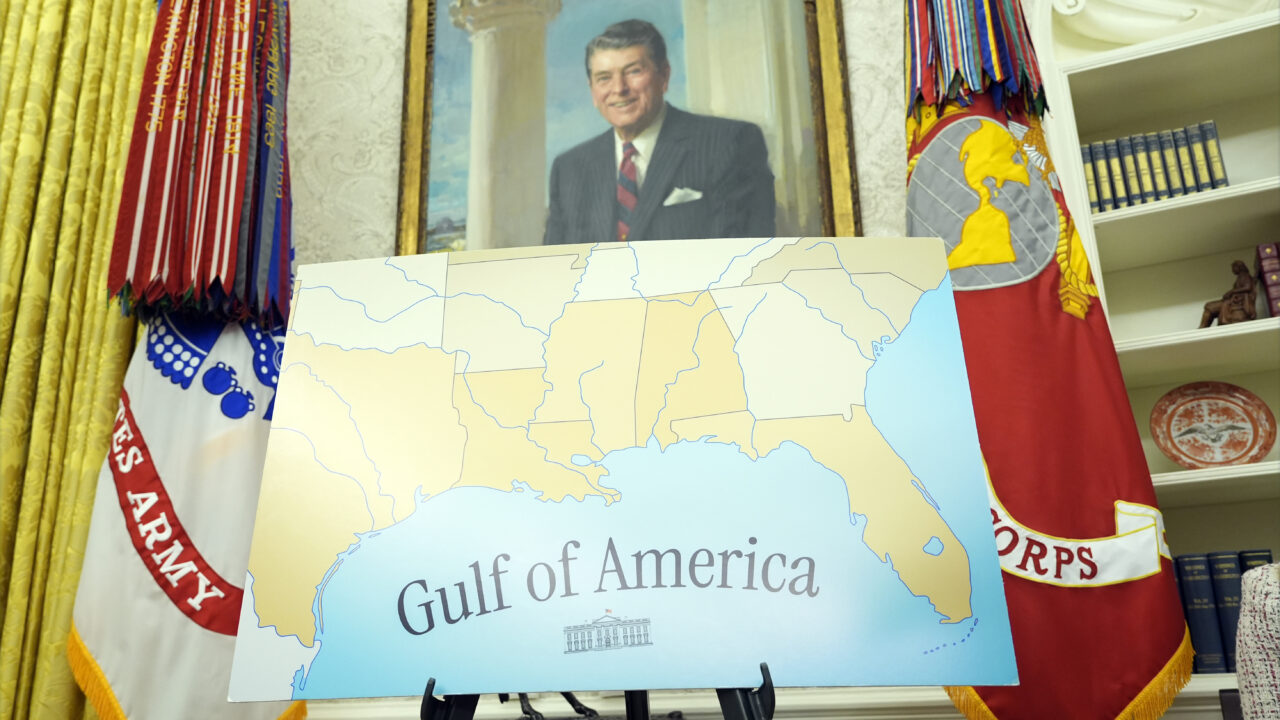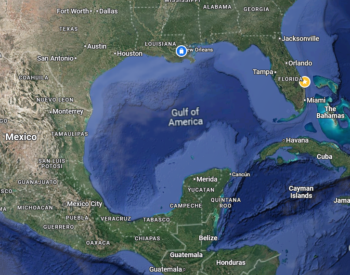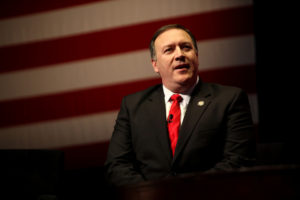Letting Trump Have His Way With Words Erodes the First Amendment
The rest of the media should unite behind the Associated Press’ stance on the Gulf of Mexico. A map featuring the words "Gulf of America" is seen during an event with President Donald Trump in the Oval Office of the White House in Washington on Feb. 11, 2025. (AP Photo/Alex Brandon)
A map featuring the words "Gulf of America" is seen during an event with President Donald Trump in the Oval Office of the White House in Washington on Feb. 11, 2025. (AP Photo/Alex Brandon)
If you are younger than 30, you probably don’t remember there was a time in the United States when we were practically ordered to hate France. After the country’s oldest European ally voiced its opposition to the U.S.-led push to invade Iraq, right-wing pundits called the French “surrender monkeys,” urging Americans to boycott French products.
At the same time, pro-war media urged a purge of the word “French” from our vocabulary, starting with renaming french fries to “freedom fries.” We even got a new breakfast: freedom toast. No federal language police were deployed to local communities, although the renaming did reach the House of Representatives cafeteria menu.
Revisionist maps
When President Donald Trump renamed the Gulf of Mexico as the Gulf of America via executive order, the days of “freedom fries” flashed back for many of us. Once again, the country’s woes were placed on another country; everything from drugs to economic anxiety could be blamed on our neighbor to the south, now run by a female, left-wing, Jewish climate scientist. Like the neocons in the post-9/11 moment flexed their imperialist muscle against “old Europe,” renaming the gulf is another way for this revanchist and expansionist Republican administration to assert that the Monroe Doctrine is back in a big way, and the rest of the hemisphere had better get used to it.

Much like “freedom fries,” the whole “Gulf of America” show feels like the lunacy of a dictator who’s off his rocker, akin to the fictional Latin American president in the Woody Allen movie “Bananas” who declares that his country’s official language will now be Swedish. But sadly, it’s not funny.
Google Maps renamed it the “Gulf of America” for those reading from the U.S., and Google “appears to have deleted some negative reviews left in the wake of its name change,” according to the BBC. Apple made the same change to its maps service, although the move failed to gain trust from the White House, which still views the company with suspicion. Incidentally, oil companies like Trump’s move.
The capitulation of Apple and Google validates a widespread fear that it isn’t just Elon Musk who is doing Trump’s dirty work to undo democracy, but that the Big Tech community generally has lined up to stay in the good graces of executive power. Apple CEO Tim Cook and Google each donated $1 million to this year’s presidential inauguration.
‘Smearing and penalizing’
Contrast that with the AP, whose reporters have been barred from official White House briefings because the agency continues to call the body of water the Gulf of Mexico. In a statement (2/11/25), AP executive editor Julie Pace said:
It is alarming that the Trump administration would punish AP for its independent journalism. Limiting our access to the Oval Office based on the content of AP’s speech not only severely impedes the public’s access to independent news, it plainly violates the First Amendment.
Said Aaron Terr of the Foundation for Individual Rights and Expression, “When the government shuts out journalists explicitly because it dislikes their reporting or political views, that violates the First Amendment.”
Committee to Protect Journalists CEO Jodie Ginsberg agreed: “These actions follow a pattern of smearing and penalizing the press from the current administration and are unacceptable.”
That pattern includes the recent Federal Communications Commission investigations into NPR and PBS funding, and into San Francisco’s KCBS for having “shared the live locations and vehicle descriptions of immigration officials.”
Place names have politics
The critics of AP‘s banning couldn’t be more correct. As silly as the spat sounds, this is government authority using its muscle to dictate what media can and cannot stay, something people of all political stripes in the United States would normally find contrary to our constitutional ideals. If the president can compel media outlets not to call bodies of water what everyone else in the world calls them, then forcing them to assert that Greenland or the Panama Canal belong to the United States isn’t so far fetched. Direct government force and official censorship, or the threat of it, are filters through which consent can be manufactured.
Generally, in journalism, the names of places and institutions carry a particular political connotation, and making a style choice for a media outlet can be difficult. Is that city in Northern Ireland called Derry, according to Irish Republicans, or Londonderry, as pro-British Loyalists have it? The choice to spell Ukraine’s capital either Kyiv or Kiev can tell the world which side of the war you’re more sympathetic toward.
This is government authority using its muscle to dictate what media can and cannot stay.
During the Indonesian occupation of East Timor, it was common for U.S. outlets to dateline reports from East Timor’s capital as “Dili, Indonesia.” This reflected Washington’s acceptance of Indonesia’s conquest; you would not have found U.S. reports during Saddam Hussein’s occupation of Kuwait datelined “Kuwait City, Iraq.”
For some observers (China Media Project, 3/30/23), referring to China’s ruling party as the Chinese Communist Party indicates that you don’t like it. Those who prefer to call it the Communist Party of China suggest that the CCP choice indicates that you somehow view the party as global, inorganic and not distinctively Chinese.
These can be hard choices for a media outlet that wants to be both accurate and impartial, but the choice to avoid indulging in Trump’s idiocy is simple. There has never been a “Gulf of America” movement, or a general belief in the U.S. that the Gulf of Mexico was somehow misnamed, until this order came out of the blue. What the Trump administration has done has created a fake controversy in order to bully the media, and the public, to go along with what it says, no matter how strange, giving the executive branch the opportunity to censor those who do not comply.
Sympathy for the White House
The only way a democratic society can keep from falling into authoritarianism is if people refuse to comply, even with the little things. Google and Apple have already failed that test. Others in the corporate media are also failing, by not standing up for AP. David Brooks, a conservative columnist at the New York Times, appeared on Fox News to sympathize with the White House, dismissing the affair as the usual antagonistic attitude the White House has with the press.
Isaac Schorr of the New York Post called the AP’s response “snooty,” saying the wire service has its own language problem, citing its choice to abandon the phrase “late-term abortion.” Schorr is free to take issue with that, but there’s a difference: The AP made that decision on its own, not because the government specifically threatened it unless it made such a change.
The Atlantic, while admitting that “denying access to a media outlet because of its choice of words violates the First Amendment,” said this is a “fight that the AP probably should never have picked in the first place,” indicating that the media should simply give up when it comes to an autocrat’s insane demands. In fact, the centrist Atlantic seemed to be in tune with the tribune of American conservatism, the National Review, which admitted that Trump was being “silly and Big Brother-ish,” but that “AP journalists suffer from an obnoxious entitlement mentality.”
As the Washington Post’s Erik Wemple reported:
How outraged is the White House press corps regarding this naked violation of the First Amendment? Not sufficiently: In her press briefing Wednesday, Leavitt faced questions from only one reporter—CNN’s Kaitlan Collins—about the matter. As [White House press secretary Karoline] Leavitt recited her position, she might as well have been stomping on a copy of the Bill of Rights under the lectern: “If we feel that there are lies being pushed by outlets in this room, we are going to hold those lies accountable. And it is a fact that the body of water off the coast of Louisiana is called the ‘Gulf of America,’” Leavitt said, noting that major tech firms have acknowledged the change.
AP continues to stand firm on this issue, and that’s a positive sign, but the rest of the media class should be standing united with the wire service. It’s easy for media outlets (some, anyway) to editorialize about the horrorshow of this administration. But they need to stand up to the administration, and refuse to comply with attempts to silence outlets or dictate how they should report.
Your support is crucial...As we navigate an uncertain 2025, with a new administration questioning press freedoms, the risks are clear: our ability to report freely is under threat.
Your tax-deductible donation enables us to dig deeper, delivering fearless investigative reporting and analysis that exposes the reality beneath the headlines — without compromise.
Now is the time to take action. Stand with our courageous journalists. Donate today to protect a free press, uphold democracy and uncover the stories that need to be told.






You need to be a supporter to comment.
There are currently no responses to this article.
Be the first to respond.